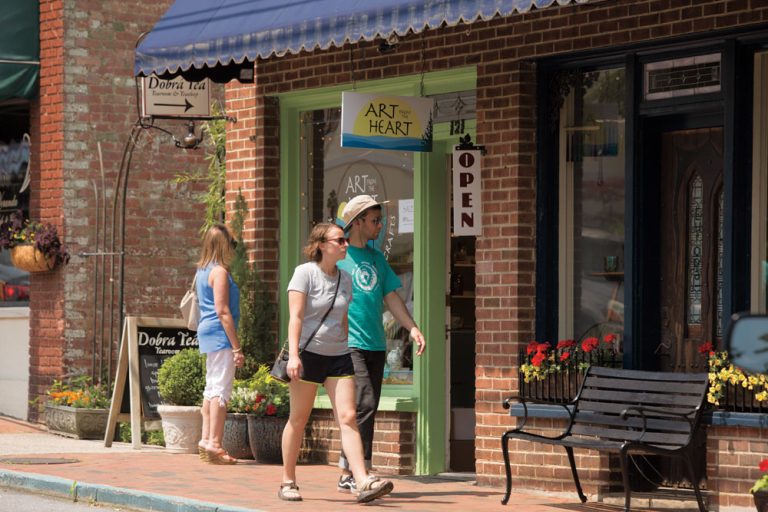How Asheville, NC is Reshaping its Community
Public, private and nonprofit sectors build synergy

Asheville’s public, private and nonprofit sectors come together in many efforts that make for a better place for residents to live, work and play.
The Collider, a nonprofit dedicated to accelerating the development of climate solutions, is a great example of that synergy in action. The organization, located in downtown Asheville, connects entrepreneurs, scientists and engineers from around the globe.
What does this look like? Director of Communications Kathi Petersen offers a few specific examples. In November 2017, The Collider hosted a seminar on respiratory health, which brought together entrepreneurs and public health professionals.
The Collider connects people in more ways than one. It is also home to a co-working facility available for businesses focused on climate solutions. Petersen says Asheville has been “a hub” for climate science and research, so it only makes sense that such an organization is based here — in “Climate City.” The National Oceanic and Atmospheric Administration (NOAA), has a National Center for Environmental Information downtown. In other words, Asheville is the intellectual capital of climate scientists, Petersen says.
Discover Why Asheville is a Top 100 Best Place to Live
Arts Initiative
Just as the scientific community is robust in Asheville, so is its artistic cohort. That’s why the Asheville Area Chamber of Commerce, along with other local organizations, has invested in a software tool to better quantify arts-related data. Creative Vitality Suite (CV Suite) was developed by Westaf, an organization partially funded by the National Endowment for the Arts, whose goals are dedicated to the creative advancement and preservation of the arts. Partner organizations include the Asheville Area Arts Council, Asheville Area Chamber of Commerce/EDC, City of Asheville, Center for Craft, Creativity & Design, River Arts District Artists, and UNC Asheville.
Heidi Reiber, director of research for the chamber, says the software provides detailed data and a built-in dashboard that allows users to compare state and national data.
“Overall, it will provide a better understanding of the arts sector in the local economy,” she says.
The hope is that the software will help organizations better measure programs and help with planning and strategic focus. In other words, organizations will be able to look at potential gaps and focus their efforts there. While the software is in the early phases of implementation, Petersen says she has high hopes for its practical application.
“We’re at the front end of understanding the data and going through the due diligence (process) to make sure we accurately understand the data,” she says.
Infrastructure, Housing Planning
The City of Asheville is committed to making an investment of a different nature. In November 2016, voters overwhelmingly approved a $74 million bond referendum package that Assistant City Manager Cathy Ball says includes funding for transportation, affordable housing and parks programs.
Ball says the city is putting its money where its mouth is, especially when it comes to addressing the issue of affordable housing. Many people who work in Asheville simply cannot afford to live within city limits. She says the $25 million housing bond referendum will allow for the city to take existing properties and make them available for lower lease payments or purchase prices.
There’s more to affordability than meets the eye, she says.
“When we talk about affordability, we look at the amount spent on rent, energy efficiency and locational efficiency,” Ball says. “It’s a holistic approach to affordability.”
Plans call for renovation of the multi-use Memorial Stadium as well as construction of an inclusive playground.The city has plans to resurface city roadways so that residents have better driving conditions.
How Asheville is the Ideal Place for Brewers and Malts
Business & Community Values
When it comes to private business investment in the community, French Broad Chocolates stands out as an example of a company committed to ensuring a better tomorrow for residents from all walks of life. In fact, that may be one of the secrets to its success.
“Our company’s values and principles are completely aligned with those (who live) in Asheville,” says co-owner Jael Rattigan.
For example, she says people vote with their dollars and believe in patronizing organizations that affirm their values. To that end, French Broad is committed to protecting and fostering things like environmental sustainability, community and collaboration. That’s why they support such organizations as ASAP, Children First/Communities In Schools and the local school system.
Rattigan says the decision to donate to various organizations is not an afterthought, but intentional and an intrinsic part of their mission and vision.
“We’re making business decisions with these values in mind, so it’s part of our daily experience,” Rattigan says.
